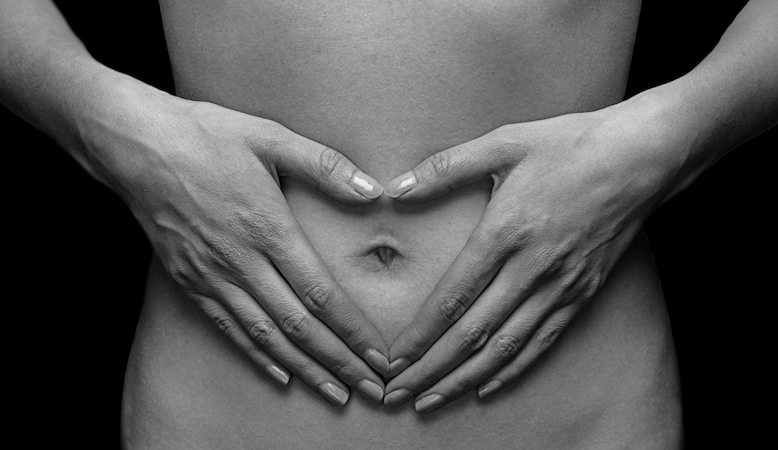Bloating. Abdominal pain. Flatulence. New research from Healthista’s first Gut Health Survey has found these are our problems – and we’re suffering in silence
Each month over 100,000 people type the word ‘bloating’ into Google. Similarly high search terms are also seen for ‘IBS’ and ‘stomach pain’.
Given the amount of feedback we get from readers, gut symptoms are a key health issue for women. That’s why we have dedicated the next four weeks to a gut health special.
To kick that off and to get a real picture of women’s gut health in the UK we asked our readers – 1700 of you aged 25 – 65 – for the details of your gut symptoms, from pain to bloating to gas and how they affect your lives.
Here’s a snapshot of what we found:
Nearly half of women have bloating, flatulence and tummy pain but nothing helps
Ouch. We were shocked when our research, which was conducted in association with Nutri Advanced, found that a staggering 49 per cent of women reported having gut symptoms such as bloating, abdominal pain and flatulence but nothing helped.

So why have so many of us reported that we haven’t found anything to fix our gut symptoms?
‘Awareness around what causes flatulence and bloating is fairly low amongst health professionals, especially doctors,’ says leading nutritionist Katherine Pardo.
Good gut ecology – the balance of good and bad bacteria – is only just becoming recognised by the medical profession as having a major influence on health, she explains.
‘Sometimes the solution might be as simple as taking a probiotic, but sometimes a more in-depth approach may be required in order to restore healthy gut function, where the person may need to address additional diet, nutritional and lifestyle factors’.
One in five women have Irritable Bowel Syndrome (IBS)
One in five of you had Irritable Bowel Syndrome (IBS), another five per cent a serious gut illness such as Ceohn’s disease or colitis and only a quarter reported no gut symptoms at all. It was a painful picture – and one we weren’t expecting to be so high.
Of your most prevalent symptoms bloating (42.75%) was by far the biggest problem followed by flatulence (16%), tummy cramping and pain (12%) and then constipation (10%).
‘A huge number of people live with these symptoms on a daily basis, and may not even think that they need to do something about it – they just seem to accept it as a normal part of life,’ Pardo asserts.
‘Often women will say that they start the day with a flat/normal stomach and progressively throughout the day they get more and more bloated,’ she explains. ‘This is incredibly common and many people may try removing things like bread and pasta from their diet before considering other options such as taking out dairy or being tested for intolerances.
‘Most people probably wouldn’t go to the doctor about it unless they were experiencing significant pain and discomfort and associated constipation and/or diarrhoea’, Pardo says.
‘At this point that they may get a diagnosis of IBS, which has historically been thought of as a stress-related condition, with few effective long-term medical solutions’.
48% have seen a doctor for their gut symptoms
Of the almost half of women who have seen a doctor for their gut symptoms, a whopping 73% of those got no help from them. It’s no secret that doctors find dealing with problems such as bloating and IBS difficult. But why?
‘Generally doctors don’t have the knowledge about gastrointestinal function and nutrition, as it is not a core part of their training,’ says Pardo. ‘And it’s often a case that the solution to a gut problem will lay in the gut and the patient’s nutrition.
‘More and more medical doctors are starting to become aware of the importance of a healthy gut and how diet and lifestyle factors affect gut function, but it is still only a relatively small percentage,’ Pardo asserts.
33% have had gut symptoms for over a DECADE
Wow. Just wow. For over a third of our respondents, suffering in silence has become the norm, and they have lived with their symptoms for over ten years. Another 30% have been experiencing pain, bloating, flatulence and other symptoms for five years.
This is clearly a long-term problem – only 7% said their symptoms started six months or less ago.
‘There’s a general tendency to just accept symptoms like flatulence and bloating as a part of life,’ says Pardo.
‘Plus, the lack of effective medical treatments leads people to suffer with more serious symptoms for a long time.
‘Most people will try various things to help, but without guidance as to which are the best alternative treatments, they may find that nothing really works for them in the long term’.
Perhaps as a result of trying everything, our research also found that a quarter of women had spent a hefty £500-£2000 on sorting out their gut health – a painfully high amount considering the lack of solutions they’re getting.

Over 50% don’t know the cause of their gut symptoms
For 54% of respondents, the cause of their gut problems was a mystery, while only 12% knew what was at the bottom of their issues and a staggering 67% had had no diagnosis at all.
So, is there a good test that can help?
‘There are tests that you can do through a nutritional practitioner that can help pinpoint what is going on in the gut – a good nutritional practitioner would be able to recommend which would be the best one and an appropriate course of treatment based on the results,’ says Pardo.
What makes you bloated? Dairy, wheat, gluten and stress
While nearly 37 per cent answered ‘I honestly don’t know’ to the question of ‘What makes you bloated,’ others were a little more aware of their triggers.
By far the biggest bloating culprit was wheat with 35% of respondents saying it made them bloated. For another 28% ‘having my period’ was a trigger and around a quarter each said, stress (27%), dairy (26%) and gluten (25%).
Around one in ten got bloated from fruit while one in 20 experienced symptoms after eating meat (6%), nuts or seeds (5%).
‘Not knowing the cause of your symptoms can be debilitating and stressful for patients,’ says Pardo – remember 67% of respondents had no diagnosis.
So what does cause bloating then?
‘Most commonly, bloating is caused by a build up of gas produced by intestinal bacteria – either in the bowel or small intestine (SIBO) – or due to inflammation as a result of food sensitivities,’ explains Pardo.
15% of women get bloated EVERY time they eat
Talk about staggering. Imagine knowing you’d get bloated at every meal? That’s exactly the case for 15% of our readers. For another 13% it was once a day and almost one in five get bloated 2-3 times a week.
Want to know what to do about gut symptoms?
Healthista’s Gut Health Special takes place every Monday for the next four weeks – news, features and expert advice covering all aspects of gut health. We’ve got you – and your bloating – covered.
